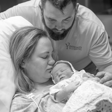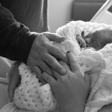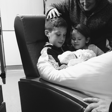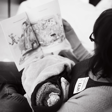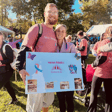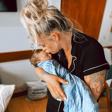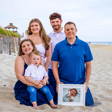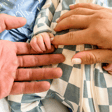Become a Creator today!Start creating today - Share your story with the world!
Start for free
00:00:00
00:00:01

Kim Capista
In our first episode in 2025, we spoke to Kim, a Philadelphia-area mom who is navigating her life after the loss of her 3rd son, David.
Kim and her husband found out early in their pregnancy, that there was a high likelihood that their baby had Trisomy 13, and it was later confirmed after an amniocentesis. She had a wonderful doctor who was supportive when finding out they would be carrying David to term, for which she was so thankful.
Join us as we hear about David's sweet life in the NICU and how his parents walked that journey together.
In memory of David Capista, 10/6/17 to 10/12/17
Transcript
Introduction and Purpose
00:00:00
Speaker
Hi, I'm Nicole and I'm Desiree. We are both mothers who run a support group for perinatal loss. Through our group, we have met many wonderful families and have had the honor of hearing about and sometimes meeting their beautiful babies. We noticed that families feel relief when they can share openly and feel seen when they meet others who are telling similar stories. So we created this podcast as a space for families to share the stories of their babies.
00:00:23
Speaker
We want to honor and remember these children. We want to help you navigate your life after loss. And most importantly, we want each story to give you hope. So please join us as we share these stories of grief and love.
Guest Introduction: Kim's Story
00:00:36
Speaker
Welcome to the Blindsided Podcast.
00:00:40
Speaker
Welcome to the Blindsided Podcast. We're your hosts, Desiree and Nicole. Say hi, Nicole. Hi. Happy New Year, guys. Today on the podcast, we have our friend Kim, and Kim is going to tell us today about her son, David. So Kim, we kind of just ask you to start wherever you want to start. It doesn't matter. It doesn't have to be right when you- You can tell us a little bit about yourself first. ... wherever you
Journey to Diagnosis
00:01:01
Speaker
want to start.
00:01:01
Speaker
Okay, so hi. I'm so happy to be here with both of you. um I'm Kim and I am currently 46 years old, but this goes back a little bit to when my husband and I were looking to expand our family. We had two sons and we were hoping for a third child and it took us a little while to conceive him, which was not the experience I had with my other two boys.
00:01:28
Speaker
We said to each other, you know, it's okay. we We have our boys. It's all right. We can be done. And then I found out like two weeks later that I was pregnant. So I was like, oh my gosh, this is like the answer to our prayers. So we were we were thrilled. And it was just like we told our children pretty quickly. They were very excited. They were three and five.
00:01:51
Speaker
at the time. So um I was going through routine screening at that time. I was maybe 11, 12 weeks and I had a blood draw to do the um test for markers for any kind of chromosomal defects and that's where you find out the gender and things like that. So I remember one morning, I got a call from the doctor's office and they said, hey, your screening came back as a high likelihood for trisomy 13. So I you know immediately got cold and knew like, this is really bad. I had heard of it, but didn't really know exactly what it was. But I had actually some friends who had a screening where they were positive and then had the amnio and it turned out to be negative. Okay.
00:02:41
Speaker
So I was like, well, I know this is really bad, but you know maybe this is wrong. They said, we want you to come in today and talk to a genetic counselor. Wow. Yeah. So my husband was getting ready for work. My boys were you know eating breakfast and suddenly were calling to get grandparents over to watch the kids so that we could make the trip to go meet with a genetic genetic counselor. So that's what we did.
00:03:09
Speaker
and The genetic counselor was very negative about what trisomy 13 was and was definitely you know telling me that if it turned out positive, that I should have an abortion. you know did She did tell us to be certain I would have to undergo an amniocentesis, which we decided to do.
Support and Decisions
00:03:31
Speaker
um I had to wait till I was 16 weeks for the amnio. Okay.
00:03:35
Speaker
So it was about two and a half weeks maybe later. But um in that meeting, you know it was just so negative and so scary. you know At the end, I said, well, is it a boy or a girl? yeah And she said, oh, well, there were X and Y chromosomes present. present I was like, okay, so it was another boy. yeah yeah So you know it was kind of like,
00:03:58
Speaker
I was grasping for some joy you know and yeah it wasn't like she really wanted to give us any personal details about them. Can I stop you there and just ask, do you know why they had you why it was so important for you to come right away um when they couldn't even do the AMIO for a few weeks? You know what I mean? I don't know. They never really said, they didn't say why, um but they dead definitely wanted me to come right away. Okay.
00:04:25
Speaker
um So then after that, you know, it was a rough few weeks of waiting till I could have the test You know, we told our family and they they didn't really know what that diagnosis would mean for us but um you know was just sorry, well, we'll wait and see and and what happens whatever happens happens and then I I did get the amnio. I met a wonderful maternal fetal medicine doctor who was amazing. and um you know He said to me and John, my husband, you know if you decide this is positive and you want to terminate the pregnancy, we said, well, we're not going that route. and He said, okay. He was like my biggest cheerleader from that moment of time.
00:05:12
Speaker
He did the amnio and I'm not sure what he saw, but he said, you know, I have a feeling ah that this is going to be a positive and um because it's ultrasound guided. So he was seeing the baby and it was interesting because if you ever had one, you you're there and you're watching it happen and there's this big long needle and you're seeing it all on the ultrasound and David's hand was kind of like reaching up towards the needle. I was like, oh my gosh.
00:05:38
Speaker
So then we did get the results that it was a positive for our trisomy 13 and it was absolutely devastating. So devastating. um It is a life-limiting diagnosis.
00:05:52
Speaker
So we were pretty sure that you know whatever happened, we we would be outliving him. But there is a huge range of anomalies that might or may not be present for that. just it's If people are familiar with Down syndrome, that's a trisomy 21. So just like there are high functioning you know people with Down syndrome, and then there are people with medical issues and that may not be as high functioning, the same can be said for trisomy 13 although it is a more severe diagnosis.
Pregnancy Progress and Birth
00:06:23
Speaker
I joined a Facebook group that was full of people who had gone through that and had children that were alive and were you know doing well and and that gave me some hope.
00:06:33
Speaker
Yeah, that's amazing. It is. And I was followed very closely throughout my whole pregnancy. And he didn't look like he had any major problems that they could see on ultrasound. Everything always looked really good.
00:06:50
Speaker
And the biggest issue um that they could see with him was that he was small. So he was he was like always on like the five to 10 percentile for growth for his gestational age. So that was being monitored. But throughout the whole thing, I had my my wonderful maternal fetal medicine doctor and met with some people at the hospital where I would deliver him to to make a plan because we didn't know what type of Shape he would be in when he was born. So we wanted to be clear like what interventions that we would do for him um so that was really difficult because you know, you're sitting there with a neonatal doctor and Going over this long list of if he needs this if he needs, you know that like what would you do? So John and I had you know said we want a full assessment at birth we wanted the NICU team in the room with me when I delivered and The thing that we said we didn't really want to do was have him on an event so that we wanted him to be able to breathe on his own. okay Looking back, you know was that the right decision or the wrong decision? I don't know. I think as a as a parent, you always say, did I do the right thing for my child? But in that respect, we thought you know we'll support him as much as we can, but we don't want him to be dependent on artificial breathing. so right
00:08:14
Speaker
The pregnancy was actually really good. I had very little issues and I was able to like start to just embrace it and enjoy my time with him. I mean, that's not saying there were some super dark days, yeah especially early on where I just was like, you know, my baby, you know, he how long is he going to be with me? You know, and it's just devastating when you have to go through a pregnancy knowing that you ah are likely to not you know raise this child. But things looked good. We had some hope. We were very hopeful you know that he would would come home with us. And kind of circling back to that genetic counselor, she called us shortly after the amnio um results had come in. The doctor actually called me with the results, and then she called to talk to me. And again, very negative woman. And she said words I will never forget. And she said, you know you might have to take this baby home.
00:09:11
Speaker
Oh my God. Yeah. Like as if that would just be a terrible thing. I was going to say, just case scenario would be that we take this baby home. Right. So she's like, you know, you might have to take this baby home as if like he was going to be like this huge burden and hope that I want a not perfect child. You know, and that was like, whoa, woman. I hope I never talk to you again. Yeah. um But things were going well. I was getting monitored a lot because one of the things that can happen um would be you know in utero passing. so I was getting non-stress tests every two weeks or maybe even every week at the end. There were some moments where we thought you know he wasn't getting enough blood flow, but he just kept doing really well, ultimately.
00:09:57
Speaker
And then when I was almost 37 weeks, I was the day before 37 weeks, I was having a non-stress test and we met with the doctor as we usually did afterwards and he said, well, I think today's the day. I was like, what? I was going to ask if you had a plan in place where like they would only let you go so far so as that you would be able to meet him, you know, for sure. Yes. So that was the the goal, um was that I would be able to deliver him alive and be able to meet him. So all of this testing was was really to make sure that he had the best chance. And there comes a time sometimes where they're you know better off outside than inside. So that was that was the point that we where we were. so
00:10:40
Speaker
ah He's like, today's the day. you know he had a little you know His heart rate went down a couple of times. You're having some contractions, which I had no idea. But um he's like, we just would prefer you know you go to the hospital. like okay So we went yeah we went there. I had been bringing a packed bag with me to every doctor's appointment just because I just never knew what was going to happen. on the edge of your seat all the time yeah so I went to the hospital it was a Thursday afternoon they started to induce me and things progressed pretty quickly with the labor by one I'm gonna get the time wrong like 117 in the morning he was born
00:11:19
Speaker
The whole NICU team was in the room and I got to hold him right away. They put him on my chest right away. And then they took him to do you know all of the assessments and everything. And then they wheeled him out after they you know did all their first initial things and they wheeled him out and John went with them and like all alone.
00:11:39
Speaker
in the delivery room, like, wow, this is weird. Nobody's here with me. Like, nurses were in and out. It was so bizarre because my phone wasn't working either. I couldn't, like, I don't know what was, I was, I don't know what happened with my phone.
00:11:54
Speaker
Um, but a nurse came in and she allowed me, she was like, use my cell phone. So I called my mom, but it was just so strange. So then one of the nurses brought me a picture of him and said, look, here he is. And it was just the sweetest picture. And he almost looked like he was smiling. a And after that, they wheeled me right in to the NICU to see him.
00:12:18
Speaker
Like before I went to a room or anything like that. And, you know, he was all hooked up to monitors and he had a CPAP on, which is for breathing assistance. You know, I held him and that was scary because he was hooked up to all these things. And just, it was hard to even to get him. And yeah we have some pictures of that moment, but it was a, it was really terrifying. And the weirdest thing was, you know, he's in the NICU and then I'm back in my room without him.
00:12:48
Speaker
right And just not knowing, in my mind, we were in for a really long hospital stay because I knew that was a you know possibility and what most babies with trisomy typically have a pretty long hospital stay um before they can come home. So in my mind, you know we were we were gearing up towards that and the whole hospital stay was a major emotional roller coaster because there were times he was doing really well and then like Day two they thought he was in kidney failure and I'm like, okay you know is this is what's is this gonna kill him like what's gonna happen and there was a really great nurse practitioner who You know just kind of explained like it's a really bad way to go if this is what he has and we're just monitoring it then the next day Kidney function was doing really well Okay
00:13:42
Speaker
but um So it was just back and forth constantly with how he was faring. He graduated off of the CPAP and was just like on a high flow nose canola. Wow. So that was great. I spent you know a lot of time in the room with him and I was also pumping to try to give him breast milk. So that was a different experience for me. I had had two children previously that I nursed.
00:14:07
Speaker
but never really had the pumping experience. So that was difficult. And then, you know, I got discharged and got to go home, but he wasn't with us. And we lived a good 30 minutes with no traffic. So good it could be 45 minutes. yeah So, you know, now I'm recovering from giving birth and I've got two little kids at home and a baby in the hospital. And I was like, I you know i felt like this could be our life for the next,
00:14:34
Speaker
several months or who knows how long so it was really hard and you know you're not supposed to drive you know after you give birth for
Balancing Family and Hospital Life
00:14:41
Speaker
a few days or weeks so i had to rely on like when john could take me to the hospital and so we were going there like twice a day for several hours. But we know it it required having you know grandparents able to be at the house with the kids and things like that. So he was born on a Friday. And then on Tuesday, he had, well, first of all, let me tell you a little bit about David because David was a tiny little peanut at four pounds, nine ounces, and had the most beautiful blonde hair, which we are all dark haired. So that was a huge surprise. And he was
00:15:19
Speaker
like So alert. So alert. It was crazy. Like if I walked into the NICU and would talk to the doctors before I greeted him, he was looking for me. He would be turning his head to try to find me at like two, three days old. And I was like, wow, that's crazy. Yeah.
00:15:38
Speaker
um He loved to have his hair like his head kind of rubbed if he was like, you know fussy but Rub his head and the funny thing was even the nurses knew that about him right away like I'm Facebook friends with several of his NICU nurses and if I post about him it's been seven years and um they'll still say something personal, you know that they remember about him and I'm like I He made a big impression for a little guy. He hated his diaper. He didn't really cry unless I changed his diaper. like He didn't even care if you were sticking him with a needle because he got that all the time. But change his diaper and he would let you know. He was really upset. So um I tried to be as active in his care as I you know could. I would do his diapers and take his temperature and things like that. So that was, you know at least I could feel like I was caring for him, mothering him in that respect.
00:16:32
Speaker
And at this point, your boys had not met him. They did. Yeah. Okay. So they came, um, I was still in the hospital, so they probably came on like Saturday okay and met him ah and they came on Sunday and met him. Um, so they did spend a little time with him. I have some great videos and pictures of that.
00:16:51
Speaker
um But they didn't know really that anything was wrong yeah um We never shared with them that he you know had a poor diagnosis. I just didn't want them to experience any sadness or Fear for his birth or anything like that, you know, they really didn't know what to expect when a baby's born My older son was only like 21 months when his brother was born. So I don't think that they knew it was strange for the baby to stay in the hospital or anything like that. So they just thought this was normal. Right.
00:17:24
Speaker
So yeah, they did meet him.
Health Challenges and Loss
00:17:26
Speaker
So um on a Tuesday, though, now he had been doing really well. And then he started having episodes where he wasn't breathing and he would need to be revived. So that was terrifying happened once on Tuesday. And then I think again, we got called in on Tuesday night. It happened again.
00:17:47
Speaker
When we weren't there and then Wednesday Morning, he did pretty well and then he had a very very bad episode that evening so now it's happening several times where they have to you know bag him and revive him and um Not that his heart had stopped but he wasn't breathing so they would have to you know get all his stats stats up again and Do they say why that happened? So apnea is very common with babies with trisomy. Okay. So they think it's like a brain connection. Okay. Where it's something kind of turns off a little bit, and they don't remember to breathe type thing. So that's possibly what it was. There were some other things going on at the time with
00:18:34
Speaker
they had really increased his feeds. like There's certain things I think back on and wonder if there was any kind of contributing factors because they had um like rapidly increased his feeds and the reasoning behind it was you know that we wanted to be able to gain weight and and everything. and But I feel like some of it he couldn't really handle and he was dealing with a lot of saliva and things like that that he couldn't quite get down.
00:18:58
Speaker
And there was also, in my opinion, a slight change when we had his um blood sent because they thought perhaps he wasn't full trisomy when he was born because he was doing so well. So we sent um to the lab for testing and it did come back full trisomy. And, you know, the doctors are not, they're just not experienced with it.
00:19:21
Speaker
And they don't know that there's babies that live and they don't know that you know kids can have a ah really valuable life with that. So I think they immediately see that diagnosis and say, all right, well, this baby is going to die. And it's there's just not enough exposure to it for the doctors. So I felt like there was a little bit of that, like, well, this is inevitable. A lot of my discussions with the doctors went from some positive things to like prepare yourself for the negative. Yeah. So, you know Wednesday was a really rough day and um by Thursday, so Wednesday we decided to stay over at the hospital. There was concern that maybe he had aspirated and was you know perhaps going to develop pneumonia. And Wednesday evening, we really didn't leave his side. I went and slept a little bit while my husband stayed with him.
00:20:14
Speaker
And then a nurse was with him to relieve him for a couple hours. And then I was back at his bedside early in the morning, like 6 a.m. And he seemed like he was in pain and not not really... He was not himself. yeah He just had a look on his face that wasn't himself. And it was it was pretty much...
00:20:35
Speaker
in everyone's minds that he may not last much longer with us so you know they asked me if i could if they could give him some morphine and i was like oh gosh morphine you know that sounds terrible to me and we settled on giving him tylenol and you know it was just things like that and They let me hold him because he was, you know, he hadn't been in hell for a while. So I held him literally the entire day, basically. um I did not get up at one time. He actually didn't have any episodes, but he was also not sleeping at all. I think he was just uncomfortable.
00:21:13
Speaker
There's a video when I first told him that day and I had ah been accustomed to like laying his head on my chest and holding him like that. And he just kept looking at me. He did not want to rest and put his head on my chest because he just wanted to see me. And it's really sweet. We have that on video. So then I had to cradle him, you know, because he just wanted to look at me. But he didn't sleep that whole day. I think he was in a lot of discomfort. And we called family to come and see him. My mom came and then my in-laws brought the boys.
00:21:43
Speaker
and you know they didn't they didn't understand but we we're pretty much having our them see him for the last time that day they have i think i forget what the program is called but they. Young life or some kind of life advancement. I don't know what it is, but maybe I can't remember what it's called but they like had teddy bears that they gave my kids for and yeah oh that's nice Yeah, they slept with those teddy bears. In fact, they still have them but they slept with them like religiously for years and years after that so then it was just John and I and evening was coming and um I had to pump because I hadn't pumped all day. So John held him and I I was pumping and
00:22:23
Speaker
And then I said, you know why? Everything's really calm. I'm going to go take a quick shower. And, you know, I was like all day in the in the in the room. I said, let me go take a shower. So I take a shower. I get dressed. And John calls me on my I mean, it's w right right outside the NICU. Basically, it was the the room they had for us. And John called me and he said, it's it's happening again. It's really bad. You need to come now.
00:22:45
Speaker
So I like race over there. The NICU opened the doors without me even having to, you know, ring or anything. I ran in there and they were working on him and they got his stats back a little bit. And, you know, I spoke to him and when he would typically look at me and get that comfort,
00:23:06
Speaker
He had a, he didn't look at me and he had a very far off gaze in his eyes. And I said to the nurse, I was like, he doesn't look right. Do you see this? Like, this doesn't look like him. And she said, do you just want to hold him, mom? And I said, yeah. And I looked at John. I said, you understand what that means? Are you okay with that? And he said, yeah, I know. So I just held him in the rocking chair.
00:23:33
Speaker
and we know we turned the volume down on all his, we turned the monitor off and I held him and I sang to him and I held him for about 45 minutes. They checked on us every once in a while and he you know was just peaceful. he you know His eyes were closed. He finally got to rest for the first time and it it was a ah heartbreaking thing. It was kind of, you know like I said, it took about 45 minutes of me holding him, but he was calm and content.
00:24:02
Speaker
and peaceful the whole time. um And then they, you know, they checked him again and and he had passed. That's just like you said, it's, it's, it's just such a beautiful way to think about. having me Yeah. well You get to hold them and just keep them warm. All they know is they feel that is you.
00:24:20
Speaker
Yeah. Yeah. I mean, if he had to go, I'm glad that it was with me holding him and it was peaceful and calm. Yeah. I'm so glad the nurse said that to you too. like She kind of gave me the permission, you know like because I was seeing that something was very different and and she knew it, of course. And um you know she just gave me that permission of like, is this what you want to do at this point? Yeah, that's awesome. Yeah. As sad as it is, like that that is nice that she did that for you. It is. And you know, that poor nurse, she was actually like, I don't know, five months pregnant at the time. And I just kept thinking like about her afterwards. I was like, Oh my gosh, she had to go through this and
00:25:02
Speaker
You know as when you're pregnant, you know, it's just a tough experience But she was wonderful and you know through the whole thing I think we always said we don't want to keep him alive for us So we did feel that he let us know when he was ready to go. So in that respect, like i I think it all just it happened as it was meant to happen. um you know Looking back, I think, well, should i have tried to you know should we have done this or should we have done that? and
00:25:35
Speaker
I'll never know what the if there could have been a different outcome, but I also didn't want to put him through pain or surgery. like If he needed, say, a heart repair, we would have wanted to try to push for that. right But like I wouldn't have wanted to just put him through something for my sake so that I could keep him longer.
00:25:54
Speaker
yeah So we got to spend time with him that evening and um you know we we bathed him, we dressed him and got photos with him. And leaving was just bizarre. and like and like like you're watching it on a tv screen like you just it was such a strange feeling to leave knowing he was gone and um i remember when i laughed i couldn't bear to lay him back down in in the bassinet and i handed him to one of our dear nurses and she held him as we walked away and you know it was just it's just a terrible thing and so devastating
00:26:32
Speaker
And um we got home that night, and my in-laws
Family Grief and Funeral
00:26:36
Speaker
were there. And when we woke up in the morning, we were like, well, we have to tell the kids. you know and And my older son, who was five, he was a awake early. My other one was still sleeping. And you know we brought him into the living room, and we talked to him. And we told him that his brother had died.
00:26:54
Speaker
And he was, you know, very sweet, and he cried a little bit, but he said, well, now David can see all the animals in the zoo, and he can see everything now. So, I mean, because I think when they were in the hospital, they didn't like that he wasn't experiencing the world, you know? So his first thought was like, well, now he sees everything. Aw. Kids are so amazing. They really are. They really are.
00:27:21
Speaker
um Did you have a service for David? We did. Yeah, we had um a full funeral for him. We had a mass and then a burial. And he is buried um in a family plot with John's grandparents. Okay. And John and I will also go there when we go. okay yeah We put our names on the stone, just because I wanted it known that we're going to be with him. And, you know, I just wanted kind of that that on there.
00:27:49
Speaker
I'm trying to get a visual. Is it like your grandparents are buried like next to each other and then you guys would be next to that? So the way they do the plots are like two on top of each other. So it it's a six person plot. So his grandparents are in the center on top of each other. And right now David is on one side. um I personally plan to be cremated. So David and I will take up one and John will be. Oh, cute. Okay. you need that So yeah, the we didn't do an open casket.
00:28:17
Speaker
And I do regret probably not seeing him one more time. When we met with the funeral director, he was like, oh, you don't want to do that. But I think it's just because I think even they are very touched emotionally when a baby dies. He was six days old when he passed.
00:28:36
Speaker
um I mean, I think he even got tears in his eyes when we were talking to him. So, uh, you know, he's like, Oh no, you don't want to do that. But looking back, ah I'm like, I should have probably been the last one to dress him and, and all of that. I feel a little, a little bit bad that I didn't do that. But we did, you know, John was like, we said our goodbyes, you know, we, we were with him at the end and we said goodbye and.
00:29:00
Speaker
um you don't want to you don't want your last memory to be of that of him in a coffin and and i probably don't but you know i think you you picture things and you imagine what it might be enough that i probably would have liked to have that last time with him like the last thing i could do for him as a mom so Well, that's like something to impart. If you meet another family that, um, is experiencing this, I'm carrying a baby to term that has a trisomy or, or any kind of um life limiting diagnosis is just to say, you know, this is what I, and you probably have like, this is what I did. Well, I would encourage you. These are like my regrets that, you know, some things that I wish maybe I would have done. Cause I feel like, you know, your experience can only help other families that are going through this. And I think when you're in that that immediate grief, you're kind of just letting people tell you what to do at that point too, because you don't know, you can't even think straight. So, um you know, if if I was said, no, you don't wanna do that, I was like, oh, all right, you know, like I'm not gonna push for it. But then later it's like, yeah, i I wish I did. But we do have, we all have locks, a little lock of his hair.
00:30:10
Speaker
Which is good. Yeah. Blonde hair. Blonde hair. But it was not too long, was it? Did they have to like shave it a little bit? No. I mean, in the back, it was actually kind of long. All my kids were born needing haircuts.
00:30:24
Speaker
ah fun It was long. It was kind of like a receding. He was like a little old man with a receding hairline, but it was kind of long in the back. Yeah.
Honoring David's Memory
00:30:31
Speaker
I was going to ask, like yeah have you done anything to honor David since his passing or do you do anything yearly? like We observe his birthday every year, so the first year his birthday fell on a Saturday and we had invited lots of family to meet us at the cemetery and we did a balloon release.
00:30:50
Speaker
And um I had a friend who sang a beautiful song that I had found online. it was it's ah i could I could tell you what it is later if I look it up, but it's a beautiful song about you know being gone too soon.
00:31:02
Speaker
um And then we came back to my house and, you know, had a cake for him and saying happy birthday. And um the year the year after that, for his second birthday, we did something similar. um And then since then, we've kept it more private, where it's just me and John and the boys. And we always go to the cemetery and have a cake for him and and things like that.
00:31:22
Speaker
That's nice. That's a good memory for the boys, too. Yeah. For the longest time, when I would tuck my kids in at night, we would blow David a kiss. And um now I don't tuck them in all the time anymore, but it was always, you know, let's blow kisses up to heaven. And that was really sweet.
00:31:40
Speaker
and They probably don't talk about it, but they're never gonna forget that yeah yeah Do they bring him up a lot in conversations or not? Sometimes sometimes they do I think they you know They're 10 and 12 now And I think that it's like an embarrassment to them to have a brother who died like they don't really want it known yeah yeah um And I get that, you know and it is what it is, but I think it's you know it's strange to them that yeah they lived through that and that that happened. When they were little, you know they would talk about him a lot. um My younger one would cry out of nowhere and say, I really miss David. and
00:32:16
Speaker
And then as they grew up, like sometimes they would use it as a, as a, you know, they squabble and they would be like, well, I wish David were here. And then he'd be the brother I would hang out with. Yeah. Oh my God.
Coping with Grief
00:32:31
Speaker
You know, I wanted to to say um a little bit about um the grieving process. I mean, I don't know if my process was the same as what others would experience, but you know, it's it was an extremely dark time for me. And oddly, like it got worse and worse, like for, I'd say i'd say almost like the three month mark was the lowest point.
00:32:58
Speaker
I mean, things you don't talk about with people like the first cold snap, I'm like, he's in the ground and it's freezing tonight, you know, like, but you know, this is terrible, you know, and I would just be crying and crying and I would spend a lot of time, well, not a lot, but every week, you know, I made sure I was at the cemetery every single week and I would spend hours there and, you know, my husband would say like,
00:33:23
Speaker
just go and say, you know, and leave. I'm like, no, I need to be with him. You know, like, I need to spend time, I would bring a blanket, I would sit there and I would just cry. And, you know, having two little kids at home, I didn't have the, I don't want to say luxury, but I didn't have the luxury just to be able to go around crying in my house all the time, you know? And then there also comes a point where people don't think you should be crying anymore, you know? It's just like, well, come on, let's go, let's go. you been this has It's been a few months now, you know?
00:33:51
Speaker
So that was something that I did every single week, and I still i still do go see them, but it's not every week, you know, and I don't need to bring a blanket. and and cry the whole time, but it was just extremely dark. It was a huge depression, and I think that's probably normal, but people you know don't understand it, and maybe don't... I don't know that you expect it even when you're when you're going through it, how you just... Personally, I just didn't even think there was ever happiness again in my life, nor did I want it, you know because my child was dead. you know so
00:34:24
Speaker
I'm happy to say that I'm a much better place, but it was hard that first, you know, those first six months were super hard. I struggled with a lot of anxiety, even like, I would say at the six month mark, terrible debilitating anxiety. And it was, it was a rough, rough time. And you feel lonely because there's there's not a lot of people that really understand that.
00:34:48
Speaker
yeah How did you get through that time? like what What tools or resources did you have that you think helped you through? When the anxiety kicked in, I did find a therapist. and you know I was like, I can't live like this anymore because I was having a lot of physical symptoms. I was you know i ended up in the hospital one day thinking I was having a heart attack. and then and Then when I knew that was anxiety, I would just had like just i couldn't eat. i couldn't you know I just had a tough time. so I did start seeing a therapist. and which was helpful. And then eventually I did end up getting on meds because it really was the only thing that got me feeling like a normal person again. You know, sometimes people need that. And um I'm glad that was available to me.
00:35:35
Speaker
I say that I just said that to somebody else because I've been on Zoloft since I had my sec. Well, even after my first child, but then I went off of it to have him and then have my second and then went back on and I've never gone off of it since. Yeah. Um, but if I didn't, cause I had this, my anxiety is the same kind you have for now. I say for no reason, but for no reason, I feel like a lot of it's hormonal and then whatever happens. But I said, like, I can just imagine back, you know, a long time ago, 40s, 50s, 30s when there, this medication was not available to me. How the heck did they get through this? I do not know because it is really debilitating. Like you said, you can't eat. You can't sleep. you just you don't want I didn't want to be around anybody, really. I know. It was ah it was a struggle. has Such a struggle. I mean, I felt sick constantly, burning stomach. make i couldn't I would force myself to eat just a little bit. I would have to go like in my room and lie down and try to shut out all the noise. like It was bad. and
00:36:33
Speaker
I'm still on medication and it's, you know, it's fine if I'm on it for a long time. and it That's how it is. And it's, like I said, I'm just glad that's available to people because, and there's no, like, people shouldn't feel bad about it because it's helpful.
00:36:48
Speaker
Yeah. It is. God made
Changed Perspectives and Support
00:36:51
Speaker
it for a reason. now thank nothing Before David and all of this happening, do you think that you're a different person than you were you know before having him and then you know going through this experience and having him and losing your your baby? Do you think it changed who you are? I think what it's done is really make me value life.
00:37:15
Speaker
so much and just just like a cliche right life is short but it really is and like I feel like I have well I have more empathy for people because first of all you know I have you know talked to other women who've gone through it and and they've been a support to me I've been a support to them different times But also like with even experiencing the anxiety and stuff, like I never realized that people could physically feel sick from things like that. It's like, oh, just move on. It's OK. Now I have a lot more empathy for for things like that. But I think it also has just made me slow down a little bit to appreciate things, like the small moments with my kids, things like that, like just how valuable and precious life is. So I think, if anything, that's what's
00:38:04
Speaker
what's changed. Yeah. Oh, this is just because I want to know like, when you were talking about the CPAP and stuff, and you talked about like, not having invented. Do you wish you had did the event at that point? Or because I feel like, yeah, well way the way it happened was like, not perfect, but it was like, meant to be that way.
00:38:23
Speaker
I don't know. Yeah, that's the struggle. Like I don't know. Honestly, like i I used to beat myself up. Like, did I do enough? Like, should I have done the vent? I'm at peace with how things went. Cause yes, he was like, he was on the CPAP and then he was, you know, his support was reduced and he was breathing well. yeah So I think we could have, maybe after he started having the acne episodes would have been the time when we could have said, well, let's,
00:38:49
Speaker
put the vent in. But I feel like it would have led to a trach down the road. yeah and and we And there are kids who are on trachs and they're living really full lives. So I see that and I think, wow, well, they made that choice and look at their child. They're four years old now and they're this and that. So no shame to anyone who did choose that. But that was just where we said we weren't going to go there.
00:39:20
Speaker
Yeah. know Yeah. Cause nobody goes into that thinking, you know, their child's going to have a trick, but because you had time to research it all beforehand, you kind of knew like this could lead to this could lead to this or otherwise you're just trusting. I think you did everything right. Because I feel like the doctors, you know, they know more than we know. That's why they're doctors. And I think they would just steer you into doing the correct things, even with the feedings. And if a vent would have helped him out for a certain amount of time,
00:39:47
Speaker
Um, just to get through any issues. I feel like the doctors would have said, I know this is not what you said you wanted, but we really feel like it would be a short term thing. I think they would have come back to you. Right. Right. Like if I knew it was let's, you know, he'll meet him for a few days and then he'll be fine, you know, or, you know,
00:40:02
Speaker
be able to breathe on his own that would have been portrayed to me too and that wasn't they were they knew that wasn't what I wanted like a trach wasn't what I wanted and things like that so I think you know that was that was pretty much um they definitely didn't steer me in that direction And then last thing is you said that you're like you want Facebook groups for pregnancies would try to meet 13 and then that they were born and okay, and I had a personal experience with the family who's Yes, fatty. right Yeah, yeah well yeah. So he's on the software. She's on the software site.
00:40:34
Speaker
So there's two. There's support. Soft is, I forget what it's called. Does he have trisomy 13 also though? He has trisomy 18. 18, okay. I knew he, I didn't know if he first had trisomy. Leo, yeah. Okay. So Leo has 18. That is typically a little less severe than 13. 13 is like the most severe trisomy of the common ones.
00:40:57
Speaker
You could have a trisomy of absolutely any. Yeah. Yeah. chromsome But yeah, I mean, she, she went through that too. And, uh, so she's on that one and you could publish the Facebook page is called trisomy 13. It's like life living with trisomy 13. And it's all for people who have chosen to have their babies. And, you know, it's sweet, but it's also like, a when I first had David and he passed.
00:41:23
Speaker
And I would see people with their kids and they were like encouraging pregnant moms. And I'm like, well, you don't know that their baby's gonna live. Like, I don't know. It's like a weird thing afterwards. Cause you're like, don't give them all the sugar-coated stuff. Cause things do happen. But you know, it is sad. There are children who have lived for years and then passed and that's devastating. And you know, we, you see it all. I'm still active on that page and like very interested. There was a woman who had a little,
00:41:50
Speaker
girl in the December of 2017, which was two months after David was born. And we had talked a little bit during pregnancy and she was like fully prepared that her child was going to pass, you know, or that it could go that way. And Peve just turned seven and she's doing really well. It's not roses, you know, there's a lot of problems, there' a lot of health issues and things like that. But she's doing great. And she's a happy, happy little girl. And Like, I feel like she's my niece, you know? Like, even though I don't, never met her. Mr. Bursey's are so close, so it's kind of like your connection. Yeah, like this is what, you would have been happy with the life her life for years. Yes, exactly. Exactly. um And then there are lots of us who, you know, talked during pregnancy. There's one girl, Isa, who lived in Florida, and we were due like, I don't know, five days apart. We both had babies with trisomy 13.
00:42:46
Speaker
And we literally talked every single day during pregnancy. um Her baby had a lot more, like in utero, they could see a ton more problems. She had um C-H-D, C-D-H, diaphragmic hernia, just like where the heart is on the wrong side and everything is mixed up in there. And she traveled to different hospitals to see if they would be able to operate and this and that. And she got turned down everywhere she went.
00:43:16
Speaker
And she delivered, I think like at 34 weeks, simply because, you know, things were going pretty bad and they knew that her daughter Angela was going to pass. And, you know, she just delivered and held her and, you know, she passed pretty quickly. But so then I knew, you know, I had to, it's like her baby had just died and I was still pregnant and it was like difficult, you know, to try to support her through that. And she trying to cheerlead for me after she's just going through this grief.
00:43:44
Speaker
And we know we we still talk, but that it was it was good to have that person to talk to. Do you have anything else that you want to add before we end, Kim? I don't think so. I think you did really good. Oh, thanks. You're amazing. yeah Oh, thank you. You're welcome.
00:44:02
Speaker
Thank you so much, Kim, for sharing your story with us today about David and his life. And thank you so much. Thank you so much for tuning into the latest episode of The Blindsided Podcast. We truly appreciate your support and time you spent with us. If you have a personal story you'd like to share on the show, don't hesitate to reach out to us. You can send us an email at nicolewiththeblindsided.com or desiré at theblindsided.com.
00:44:27
Speaker
For more episodes, make sure to follow on your favorite podcast at just search the blindsided podcast and hit that follow button. You can also connect with us on social media too. You can find us on Facebook and Instagram at the blindsided podcast. We love engaging with our listeners and hearing your thoughts on each episode.
00:44:45
Speaker
And before you go, consider leaving a rating and review for our show. Your feedback helps us reach more listeners who might find value in the stories and discussions we share. Once again, thank you for listening and being a part of the Blindsided community.


